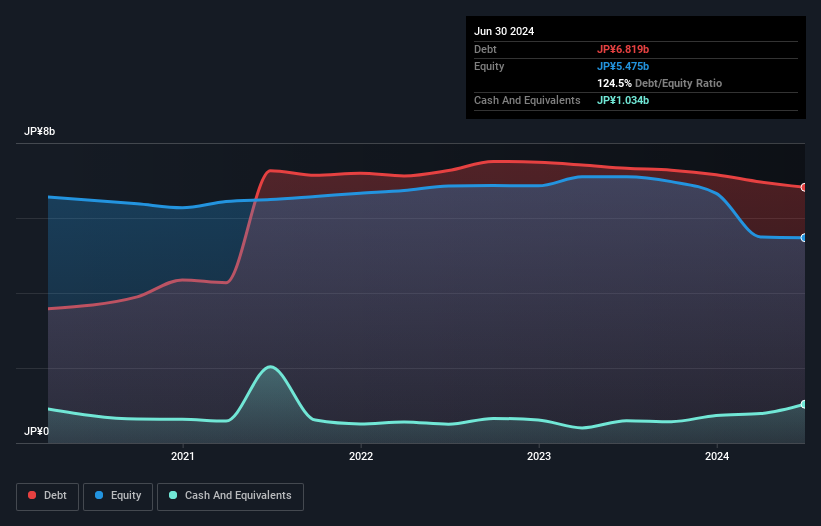Is Titan Kogyo (TSE:4098) Using Debt In A Risky Way?
Some say volatility, rather than debt, is the best way to think about risk as an investor, but Warren Buffett famously said that 'Volatility is far from synonymous with risk.' So it seems the smart money knows that debt - which is usually involved in bankruptcies - is a very important factor, when you assess how risky a company is. We note that Titan Kogyo, Ltd. (TSE:4098) does have debt on its balance sheet. But should shareholders be worried about its use of debt?
When Is Debt A Problem?
Debt and other liabilities become risky for a business when it cannot easily fulfill those obligations, either with free cash flow or by raising capital at an attractive price. Ultimately, if the company can't fulfill its legal obligations to repay debt, shareholders could walk away with nothing. While that is not too common, we often do see indebted companies permanently diluting shareholders because lenders force them to raise capital at a distressed price. Of course, plenty of companies use debt to fund growth, without any negative consequences. When we examine debt levels, we first consider both cash and debt levels, together.
See our latest analysis for Titan Kogyo
What Is Titan Kogyo's Net Debt?
As you can see below, Titan Kogyo had JP¥6.82b of debt at June 2024, down from JP¥7.32b a year prior. However, it does have JP¥1.03b in cash offsetting this, leading to net debt of about JP¥5.79b.

How Healthy Is Titan Kogyo's Balance Sheet?
According to the last reported balance sheet, Titan Kogyo had liabilities of JP¥5.66b due within 12 months, and liabilities of JP¥3.42b due beyond 12 months. Offsetting these obligations, it had cash of JP¥1.03b as well as receivables valued at JP¥2.18b due within 12 months. So its liabilities total JP¥5.87b more than the combination of its cash and short-term receivables.
This deficit casts a shadow over the JP¥2.60b company, like a colossus towering over mere mortals. So we definitely think shareholders need to watch this one closely. At the end of the day, Titan Kogyo would probably need a major re-capitalization if its creditors were to demand repayment. The balance sheet is clearly the area to focus on when you are analysing debt. But you can't view debt in total isolation; since Titan Kogyo will need earnings to service that debt. So when considering debt, it's definitely worth looking at the earnings trend. Click here for an interactive snapshot.
In the last year Titan Kogyo wasn't profitable at an EBIT level, but managed to grow its revenue by 4.7%, to JP¥8.1b. We usually like to see faster growth from unprofitable companies, but each to their own.
Caveat Emptor
Importantly, Titan Kogyo had an earnings before interest and tax (EBIT) loss over the last year. Indeed, it lost a very considerable JP¥743m at the EBIT level. When we look at that alongside the significant liabilities, we're not particularly confident about the company. We'd want to see some strong near-term improvements before getting too interested in the stock. For example, we would not want to see a repeat of last year's loss of JP¥1.5b. In the meantime, we consider the stock to be risky. When analysing debt levels, the balance sheet is the obvious place to start. But ultimately, every company can contain risks that exist outside of the balance sheet. We've identified 2 warning signs with Titan Kogyo (at least 1 which is a bit concerning) , and understanding them should be part of your investment process.
If you're interested in investing in businesses that can grow profits without the burden of debt, then check out this free list of growing businesses that have net cash on the balance sheet.
Have feedback on this article? Concerned about the content? Get in touch with us directly. Alternatively, email editorial-team (at) simplywallst.com.
This article by Simply Wall St is general in nature. We provide commentary based on historical data and analyst forecasts only using an unbiased methodology and our articles are not intended to be financial advice. It does not constitute a recommendation to buy or sell any stock, and does not take account of your objectives, or your financial situation. We aim to bring you long-term focused analysis driven by fundamental data. Note that our analysis may not factor in the latest price-sensitive company announcements or qualitative material. Simply Wall St has no position in any stocks mentioned.
 Index Options
Index Options CME Group
CME Group Nasdaq
Nasdaq Cboe
Cboe TradingView
TradingView Wall Street Journal
Wall Street Journal